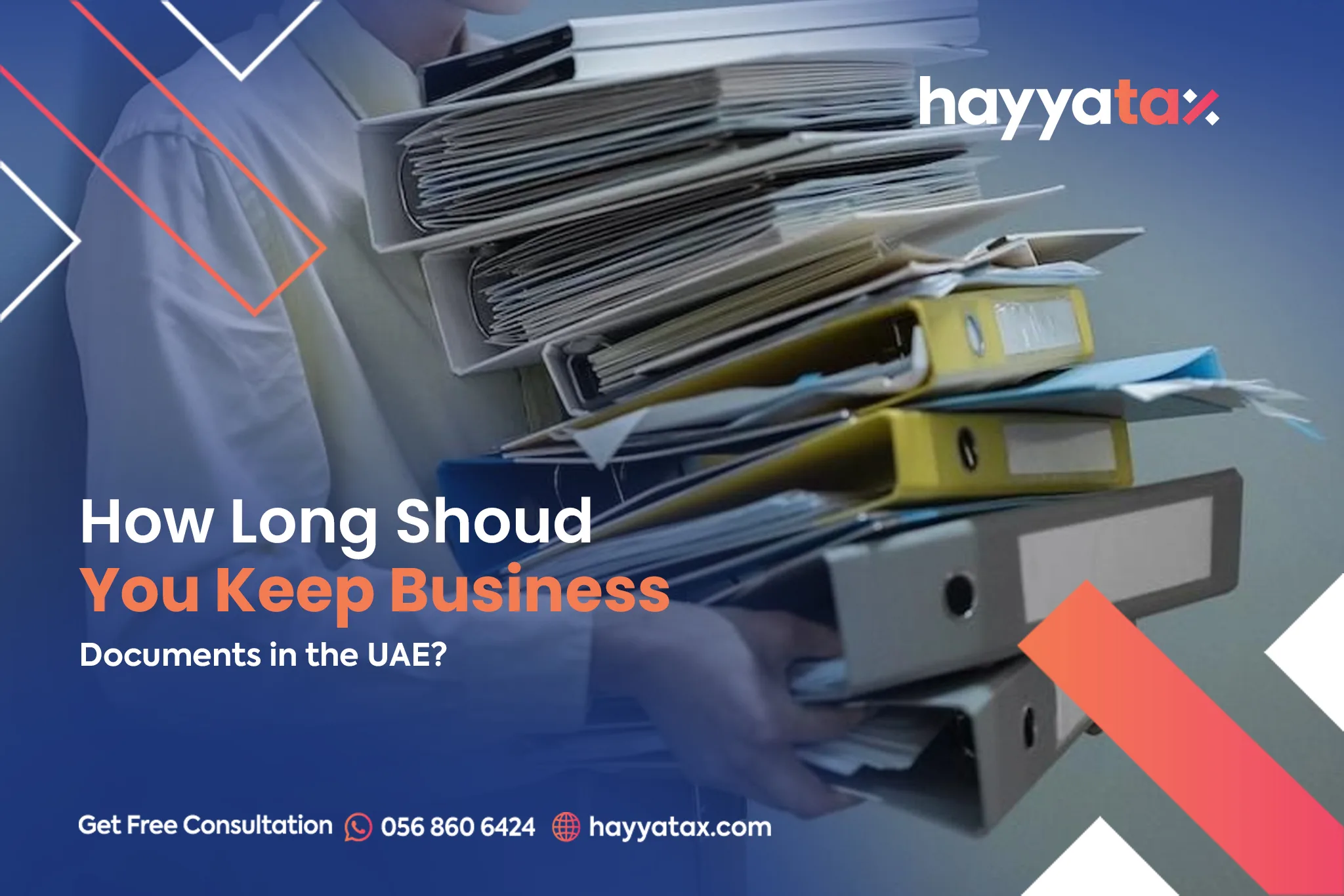In today’s competitive business landscape, success extends beyond profitability. Effective compliance with regulatory requirements, particularly those related to document retention, plays a crucial role in sustainable business operations in the UAE. As a leading tax consultancy in Dubai, HayyaTax understands that proper document management is not just good practice—it’s essential for legal compliance and business continuity.
With the introduction of the UAE Corporate Tax in 2023 and existing VAT regulations, businesses face an increasingly complex regulatory environment. This comprehensive guide outlines how long you should in the UAE and explains how proper management can protect your business while ensuring compliance.
Critical Document Retention Periods in the UAE
VAT Documentation (5-15 Years)
As experienced tax consultants in Dubai, we advise businesses to adhere strictly to Federal Tax Authority (FTA) guidelines for VAT record-keeping:
- Standard VAT records: Minimum 5 years from the end of the relevant tax period
- Capital asset records (machinery, equipment): 10 years from the end of the relevant tax period
- Real estate transaction documents: Minimum 15 years
These records include tax invoices, credit notes, import/export documentation, accounting records, and bank statements relevant to VAT transactions. Incomplete records may result in penalties during tax audits.
UAE Corporate Tax Records (7 Years)
With the implementation of UAE Corporate Tax from June 1, 2023, businesses must maintain:
- Financial statements showing the calculation of taxable income
- Supporting documentation for all figures reported in Corporate Tax returns
- Records substantiating tax exemptions or reliefs claimed
- Transfer pricing documentation for related party transactions
All Corporate Tax records must be retained for a minimum of 7 years following the end of the relevant tax period. Our tax filing in Dubai specialists emphasize that these records must be readily accessible and organized to facilitate smooth audits.
Employment and Payroll Records (7-10 Years)
Businesses should retain:
- Employee contracts and amendments
- Salary certificates and payroll records
- End-of-service calculations
- Work permits and residency documentation
- Timesheets and attendance records
We recommend keeping these documents for at least 7 years after employment termination. In cases involving workplace incidents or disputes, retention should extend to 10 years after resolution.
Business and Legal Records (7 Years to Permanent)
- Contractual agreements: Minimum 7 years after contract completion
- Commercial licenses and permits: Duration of business plus 2 years
- Business ownership documents: Permanently (trade licenses, memorandum of association)
- Board meeting minutes and shareholder resolutions: Permanently
- Property ownership records: Permanently
Factors Affecting Document Retention Requirements
Business Structure and Size
Document retention requirements vary based on your company structure:
- Mainland companies follow Federal and Emirate-level regulations
- Free zone entities must adhere to both UAE federal law and specific free zone requirements
- Larger enterprises typically face more stringent record-keeping obligations
Industry-Specific Requirements
Certain sectors face additional regulatory requirements:
- Financial services: Extended retention periods for KYC and transaction records
- Healthcare: Longer retention periods for patient and medical records
- Insurance: Extended retention for policy and claims documentation
- Construction: Project documentation retention throughout defect liability periods
Digital Versus Physical Records
The UAE recognizes electronically stored documents as valid, provided they:
- Are stored in a manner that preserves their integrity
- Remain accessible throughout the required retention period
- Can be readily converted to readable format when required by authorities
Best Practices for Document Retention
Develop a Comprehensive Document Management System
- Create a categorized filing system for different document types
- Implement clear naming conventions and version control
- Establish a schedule for regular backups
- Define security protocols for sensitive information
Regular Compliance Reviews
As specialists in tax filing in Dubai, we recommend:
- Conducting annual reviews of your document retention policies
- Staying informed about regulatory changes
- Implementing systematic document destruction procedures for expired records
- Maintaining a document destruction log
Digital Transformation of Document Management
Consider:
- Implementing document management software
- Using cloud storage with appropriate security measures
- Creating searchable archives of scanned documents
- Establishing access controls based on staff roles
Consequences of Non-Compliance
Failure to maintain proper records can result in:
- Significant financial penalties
- Additional tax assessments
- Business license complications
- Difficulties in dispute resolution
- Challenges during business transfers or sales
How HayyaTax Can Help
As a premier tax consultancy in Dubai, HayyaTax offers comprehensive document management solutions:
- Custom document retention policies aligned with your industry and business structure
- Regular compliance reviews to ensure adherence to changing regulations
- Expert guidance on UAE Corporate Tax record-keeping requirements
- Digital transformation consultation for document management systems
- Audit preparation assistance
Our team of experienced tax consultants in Dubai provides tailored solutions to ensure your business maintains impeccable records while focusing on core operations.
Conclusion
In the complex regulatory environment of the UAE, proper document retention is not merely a compliance issue—it’s a business necessity. With the recent introduction of UAE Corporate Tax and ongoing VAT requirements, businesses must establish robust document management systems.
HayyaTax, your trusted partner for tax filing in Dubai, offers the expertise and support needed to navigate these requirements efficiently. Contact our team today to ensure your business meets all document retention obligations while operating with confidence in the UAE market.
